名词性从句&定语从句
- 格式:doc
- 大小:47.50 KB
- 文档页数:10
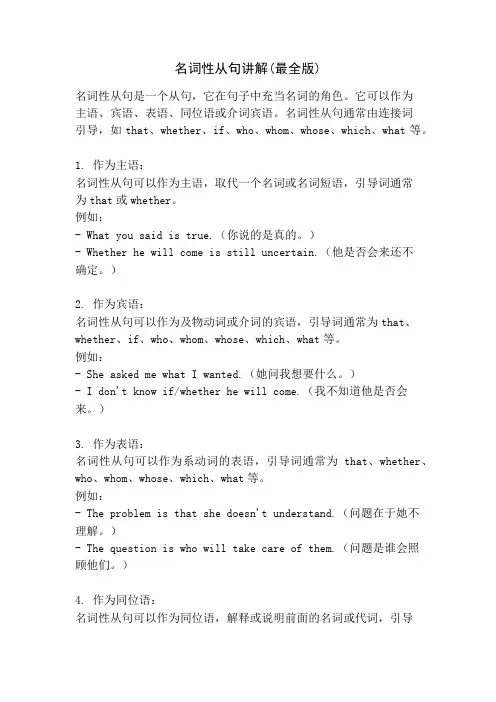
名词性从句讲解(最全版)名词性从句是一个从句,它在句子中充当名词的角色。
它可以作为主语、宾语、表语、同位语或介词宾语。
名词性从句通常由连接词引导,如that、whether、if、who、whom、whose、which、what等。
1. 作为主语:名词性从句可以作为主语,取代一个名词或名词短语,引导词通常为that或whether。
例如:- What you said is true.(你说的是真的。
)- Whether he will come is still uncertain.(他是否会来还不确定。
)2. 作为宾语:名词性从句可以作为及物动词或介词的宾语,引导词通常为that、whether、if、who、whom、whose、which、what等。
例如:- She asked me what I wanted.(她问我想要什么。
)- I don't know if/whether he will come.(我不知道他是否会来。
)3. 作为表语:名词性从句可以作为系动词的表语,引导词通常为that、whether、who、whom、whose、which、what等。
例如:- The problem is that she doesn't understand.(问题在于她不理解。
)- The question is who will take care of them.(问题是谁会照顾他们。
)4. 作为同位语:名词性从句可以作为同位语,解释或说明前面的名词或代词,引导词通常为that、whether、who、whom、whose、which、what等。
例如:- The fact that he lied surprised me.(他撒谎的事实让我感到惊讶。
)- His belief that she will succeed is unwavering.(他坚信她会成功。
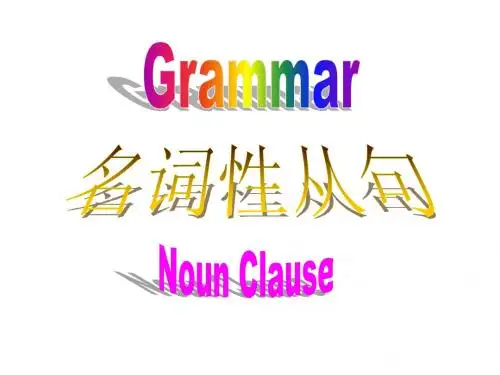


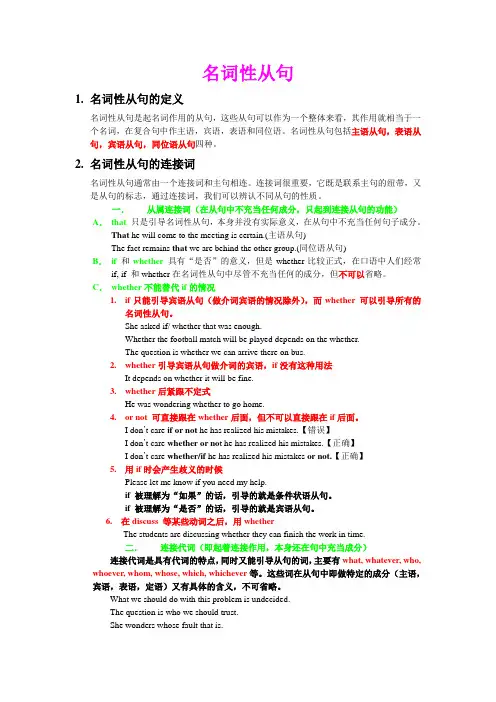
名词性从句1.名词性从句的定义名词性从句是起名词作用的从句,这些从句可以作为一个整体来看,其作用就相当于一个名词,在复合句中作主语,宾语,表语和同位语。
名词性从句包括主语从句,表语从句,宾语从句,同位语从句四种。
2.名词性从句的连接词名词性从句通常由一个连接词和主句相连。
连接词很重要,它既是联系主句的纽带,又是从句的标志,通过连接词,我们可以辨认不同从句的性质。
一.从属连接词(在从句中不充当任何成分,只起到连接从句的功能)A.that 只是引导名词性从句,本身并没有实际意义,在从句中不充当任何句子成分。
That he will come to the meeting is certain.(主语从句)The fact remains that we are behind the other group.(同位语从句)B.if和whether具有“是否”的意义,但是whether比较正式,在口语中人们经常if, if 和whether在名词性从句中尽管不充当任何的成分,但不可以省略。
C.whether不能替代if的情况1.if只能引导宾语从句(做介词宾语的情况除外),而whether 可以引导所有的名词性从句。
She asked if/ whether that was enough.Whether the football match will be played depends on the whether.The question is whether we can arrive there on bus.2.whether引导宾语从句做介词的宾语,if没有这种用法It depends on whether it will be fine.3.whether后紧跟不定式He was wondering whether to go home.4.or not 可直接跟在whether后面,但不可以直接跟在if后面。

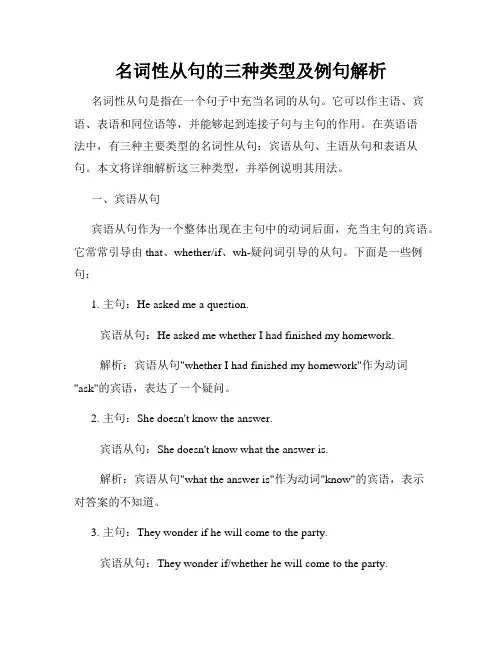
名词性从句的三种类型及例句解析名词性从句是指在一个句子中充当名词的从句。
它可以作主语、宾语、表语和同位语等,并能够起到连接子句与主句的作用。
在英语语法中,有三种主要类型的名词性从句:宾语从句、主语从句和表语从句。
本文将详细解析这三种类型,并举例说明其用法。
一、宾语从句宾语从句作为一个整体出现在主句中的动词后面,充当主句的宾语。
它常常引导由that、whether/if、wh-疑问词引导的从句。
下面是一些例句:1. 主句:He asked me a question.宾语从句:He asked me whether I had finished my homework.解析:宾语从句"whether I had finished my homework"作为动词"ask"的宾语,表达了一个疑问。
2. 主句:She doesn't know the answer.宾语从句:She doesn't know what the answer is.解析:宾语从句"what the answer is"作为动词"know"的宾语,表示对答案的不知道。
3. 主句:They wonder if he will come to the party.宾语从句:They wonder if/whether he will come to the party.解析:宾语从句"if/whether he will come to the party"作为动词"wonder"的宾语,表达了对他是否会来参加派对的疑问。
二、主语从句主语从句作为一个整体出现在句子的最前面,充当主句的主语。
它通常由that引导,也可以由wh-疑问词引导。
以下是一些例句:1. 主句:It is important to learn a foreign language.主语从句:That she is a hardworking student is important.解析:主语从句"That she is a hardworking student"作为句子的主语,强调了她是一个勤奋的学生的重要性。

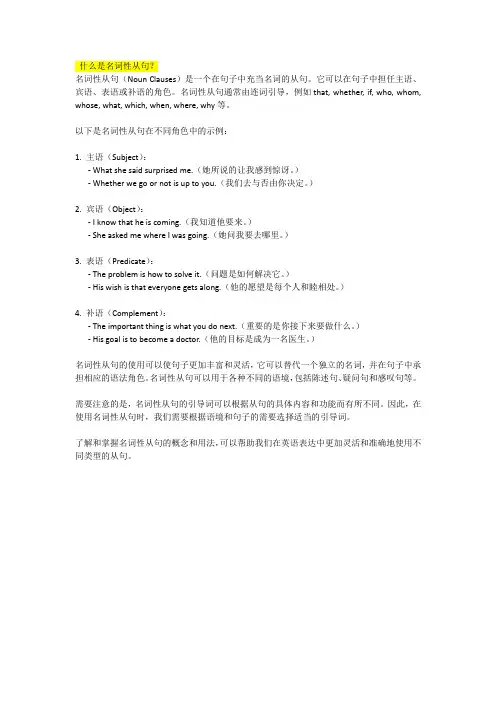
什么是名词性从句?名词性从句(Noun Clauses)是一个在句子中充当名词的从句。
它可以在句子中担任主语、宾语、表语或补语的角色。
名词性从句通常由连词引导,例如that, whether, if, who, whom, whose, what, which, when, where, why等。
以下是名词性从句在不同角色中的示例:1. 主语(Subject):- What she said surprised me.(她所说的让我感到惊讶。
)- Whether we go or not is up to you.(我们去与否由你决定。
)2. 宾语(Object):- I know that he is coming.(我知道他要来。
)- She asked me where I was going.(她问我要去哪里。
)3. 表语(Predicate):- The problem is how to solve it.(问题是如何解决它。
)- His wish is that everyone gets along.(他的愿望是每个人和睦相处。
)4. 补语(Complement):- The important thing is what you do next.(重要的是你接下来要做什么。
)- His goal is to become a doctor.(他的目标是成为一名医生。
)名词性从句的使用可以使句子更加丰富和灵活,它可以替代一个独立的名词,并在句子中承担相应的语法角色。
名词性从句可以用于各种不同的语境,包括陈述句、疑问句和感叹句等。
需要注意的是,名词性从句的引导词可以根据从句的具体内容和功能而有所不同。
因此,在使用名词性从句时,我们需要根据语境和句子的需要选择适当的引导词。
了解和掌握名词性从句的概念和用法,可以帮助我们在英语表达中更加灵活和准确地使用不同类型的从句。

名词性从句有哪些名词性从句共有四种,分别是主语从句(整个从句在主句中做主语),表语从句(整个从句在主句中做表语),同位语从句(整个从句在主句中做同位语),宾语从句四类(整个从句在主句中做宾语)。
名词性从句有哪些1、主语从句例如:It + be + 形容词/名词/动词过去分词 + that 从句It is strangethat he knows nothing about it.从句:He knows nothing about it.主句:It is strange something (= He knows nothing about it).连接词在从句中是否充当成分:否连接词是否可省:否2、宾语从句例如:that 引导的宾语从句I think that English is important.从句:English is important.主句:I think something (= English is important).连接词在从句中是否充当成分:否连接词是否可省:是3、表语从句用法和结构同宾语从句,区别在于:系动词后面所接的从句为表语从句,而及物动词后面所接的从句为宾语从句。
例如:- that 引导的表语从句The truth is that English is important.从句:English is important.主句:The truth is something (= that English is important).4、同位语从句同位语从句就是在复合句中作名词的同位语的名词性从句。
同位语从句对于名词进一步解释,说明名词的具体内容,一般由that引导,同位语从句有时可以不紧跟在它所说明的名词后面,而是被别的词隔开。
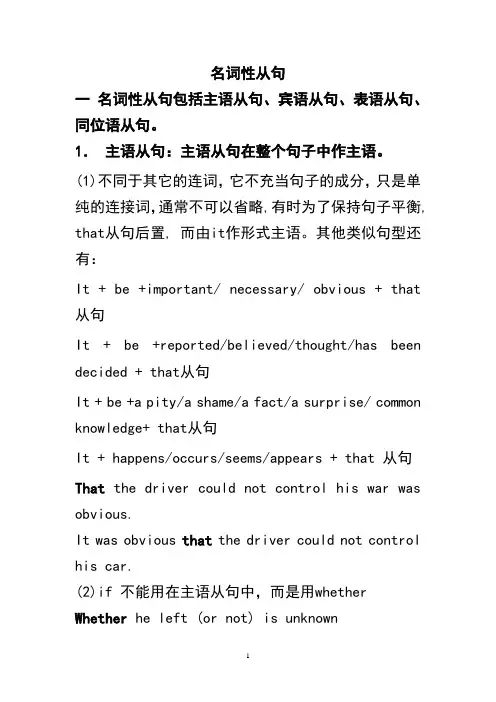
名词性从句一名词性从句包括主语从句、宾语从句、表语从句、同位语从句。
1.主语从句:主语从句在整个句子中作主语。
(1)不同于其它的连词,它不充当句子的成分,只是单纯的连接词,通常不可以省略,有时为了保持句子平衡, that从句后置, 而由it作形式主语。
其他类似句型还有:It + be +important/ necessary/ obvious + that 从句It + be +reported/believed/thought/has been decided + that从句It + be +a pity/a shame/a fact/a surprise/ common knowledge+ that从句It + happens/occurs/seems/appears + that 从句That the driver could not control his war was obvious.It was obvious that the driver could not control his car.(2)if 不能用在主语从句中,而是用whether Whether he left (or not) is unknown(3)当主语从句作主语时,谓语动词一般用第三人称单数What we need is more time and money.What we need are many more books.2.表语从句:表语从句出现在系动词后,充当表语。
其基本结构为: 主语 + 系动词 + that从句。
The trouble is that we are short of money.Go and get your coat. It’s where you left it.3.宾语从句:及物动词,形容词和介词后加宾语从句作其宾语。
(1)宾语从句时态与主句相呼应,但宾语从句表示的是客观真理或普遍现象除外The teacher told us that the earth moves aroundthe sun(2)连词whether和 if可以互换,但注意下列情况连词后紧跟or not时用whether I want to knowwhether or not they will come. 作介词宾语是用whether引导宾语从句He wasinterested in whether he saw her there. 连接词后直接加不定式,不能用if只能用whether Hedoesn’t know whether to stay or not. 如果宾语从句是否定时,一般用if引导I care ifhe will not attend the meeting.(3)当宾语从句后带宾补时,要用“主语+谓语+it +宾补+that-clause,that不可省略I think it certain that she will do well inher exam.(4)当主语是I, we ,主句用think, believe, suppose, expect, imagine五个动词时,用否定转移I don’t think he will win the game, will he?(5)that在宾语从句常可以省略,但由and或 but连接两个或多个宾语从句时,仅可以省略第一个连词that He said (that) he had eaten nothing but that he wasn’t hungry.(6)注意区别if引导的宾语从句和条件状语从句I don’t know if he will come.If he comes, I’ll let you know.注意:beg, insist, desire, command, order, suggest, advise, demand, require, request等动词如果后面加上宾语从句的话, 从句谓语部分必须用should do。
名词性从句一、名词性从句概述名词性从句包括主语从句、宾语从句、表语从句和同位语从句。
名词性从句主要有四种从句结构:以that引导的从句;以whether/if引导的从句;以特殊疑问词引导的从句;以what 或wh-ever等关系代词引导的名词性从句。
此外,as if/ as though也可以用来引导表语从句。
that1主语从句That we are sure to overcome the difficulty is believed by every one of us.That he is a nice boy is a well-known fact.(1)that从句做主语时,常用it作形式主语It is believed by every one of us that we are sure to overcomethe diffieculty.It is a well-k nown fact that he is a nice boy.It is probable that he has told her everythi ng.(2)it作形式主语时,在口语和非正式文体中,that常可省略,但that从句放在句首时that不能省略。
It' a pity (that) we can 'go to the party.That he is admitted by a famous uni versity is good n ews to his family.2、宾语从句He told me (that) he was going abroad the next mon ths.Do you know (that) he has bee n fired?(1)在接复合宾语的动词后,一般用it 作形式宾语。
Do you think it necessary that we should leave so early?We have made it clear that we won 't accept that suggestion.(2)that从句如果充当介词宾语,一般要用it做形式宾语You can depend on it that he will be always there to help you. 有时可以直接做except,in 的宾语He is different from his collegues in that he always devotes his spare time to doing volunteering work.He is a good student except that he is sometimes a little bit careless.3、表语从句His suggestion is that we should do more reading practice.My idea is that we 'd better act at once.4、同位语从句that 引导同位语从句时,一般放在某些抽象名词之后,对该词的具体内容进行补充说明。
什么是名词性从句?名词性从句(Noun Clauses)是一种在句子中作为名词的从句。
这意味着它可以在句子中担任名词的角色,例如主语、宾语、表语或补语。
名词性从句通常由连接词引导,如that, whether, if, who, whom, whose, which, what, when, where, why等。
下面是关于名词性从句的详细解释和使用方法:1. 主语从句(Subject Clauses):主语从句在句子中充当主语的角色,它引导整个从句的连接词通常是that或whether。
以下是主语从句的一些例子:- That he passed the exam made her happy.(他通过了考试使她开心。
)- Whether we should go or not is still undecided.(我们是否应该去还没有决定。
)需要注意以下几点:-当主语从句以that引导时,that往往可以省略,但在某些情况下必须保留,如在强调句型中。
-当主语从句以whether引导时,通常表示两个选择或疑问。
2. 宾语从句(Object Clauses):宾语从句在句子中充当动词的宾语,它可以作为及物动词、介词或不定式的宾语。
以下是宾语从句的一些例子:- She asked if I could help her.(她问我是否能帮助她。
)- He doesn't know what to do.(他不知道该做什么。
)需要注意以下几点:-当宾语从句以that引导时,that往往可以省略,特别是在口语中。
-当宾语从句以whether或if引导时,表示选择或疑问的情况。
3. 表语从句(Predicate Clauses):表语从句在句子中充当表语的角色,它通常用来描述主语的性质、状态或特征。
以下是表语从句的一些例子:- The important thing is that you try your best.(重要的是你尽力。
名词性从句名词性从句[主语从句、宾语从句、表语从句、同位语从句](含:强调句型)在句子中起名词作用的各种从句,统称为名词性从句。
根据它们在句中所起的语法作用,这类从句分别称为主语从句、宾语从句、表语从句、同位语从句。
1.引导名词性从句的连接词(1)在非正式场合,that在引导宾语从句时可省去。
(2)whether 能引导所有名词从句,而且能和or (not)连用;if只能引导宾语从句,而且不能和or (not)连用。
(3)w hat引导名词性从句时,可有两种意义:①保持原有的疑问意义。
②表示“…东西”,“…事情”(4)从句要用陈述语序,尤其是含疑问意义的wh- 类词引出的从句要倍加注意:(5)带-ever 的关系代词起强调的作用:2.主语从句主语从句有三种类型:由that引导的主语从句;由连接代(副)词引导的主语从句;由关系代词型what或whatever引导的主语从句。
1>.由that引导的主语从句。
一般很少放在居首,只有为了强调或谓语较长才放在句首。
一般都用作形式主语,而将从句放在句末。
2>. What/whatever/whoever…引导的主语从句一般放在居首。
3>.由whether 及其他连词引导的主语从句放在居首句末皆可。
4>.如果带主语从句的句子是疑问式,则须用it作形式主语结构。
5>.常见的用it作形式主语的复合句结构主要有下面几类:a.it + be +形容词+ 从句b.it + be + 名词+ 从句c.It + 动词(+宾语或状语)+从句d.It + 动词的被动语态+ 从句e.it + 动词be + that 从句6>.主语为从句时,谓语动词一般要用单数形式;但如果what 引导的从句作主语、代表复数概念(常可从表语上看出)时,谓语动词则常用复数形式。
3.宾语从句1>.作动词的宾语a.大部分宾语从句直接更在动词后。
b. 有些宾语从句前要有间接宾语c. 如果宾语从句后面有宾语补足语,要使用形式宾语it,而将从句放在不足语后面。
名词性从句名词性从句是指在句子中承担名词功能的从句,需要引导词引导。
引导词有:that,who,whom,whose,what,which,whoever,whomever,whatever.when .where,how,why,if, whether名词性从句包括主语从句,表语从句,同位语从句,宾语从句。
1.主语从句概念:主语从句是指在主从复合句中作主语的从句eg.whoever is in a hurry shows that the thing he is about is too big for him.(不管是谁,匆匆忙忙只能说明他不能从事他正在干的工作)What we call”moral” is simply blind obedience to words of conmand.(我们所谓的“道德”,只是对命令语句盲目服从而已。
)2.表语从句概念:表语从句是指在主从复合句中作表语的从句。
The highest possible stage in moral culture is when we recognize that we ought to control thoughts.(当我们认识到要控制思想时,道德修养便达到了最高的境界。
)The biggest problem of fathers is that they want to control their children.(父亲们最大的问题是试图控制他们的孩子。
)3.宾语从句概念:宾语从句是指在主从复合句中作直接宾语、间接宾语或介动词宾语的从句。
Eg.I don’t know who my father was. I’m much more concerned to know what his son will be .动宾结构(我不知道我爸爸是什么样的人,我更关心的是他的儿子会成为什么样的人。
)The secret of being miserable is to have leisure to bother about whether you are happy or not.介宾结构(痛苦的秘密在于有闲工夫担心自己是否幸福。
20111013Grammars V名词性从句主要包括主语从句、宾语从句、表语从句和同位语从句。
1. 主语从句I. that引导的主语从句that无词义,只起引导主语从句的作用,在从句中不但当成分,但不能省略。
That they will refuse the offer is unlikely.That light travels in straight lines is known to all.II. whether引导的主语从句该从句含有选择的意义,不能用if替换。
Whether he’ll say or leave doesn’t matter.III. 连接代词引导的主语从句连接代词在从句中作主语、宾语或定语,均不能省略。
What you will do next will influence our whole plan.Who will chair the meeting has not yet been decided.IV. 连接副词引导的主语从句连接副词在从句中作状语,均不能省略。
When we must fulfill our production task is am important question. V. 主语从句的位置主语从句可以直接放在主语位置上,也可以用it作形式主语,而将主语从句放在句末。
It hasn’t been decided who will head the group.It is common knowledge that the whale is not a fish.It seems that you know a lot about computer.2. 宾语从句I.that, whether, if引导的宾语从句They claimed that their team had won.I doubt whether/if they will be able to arrive here on time.II. 连接代词引导的宾语从句Do you know who invented the computer?He will do whatever the teacher asks him to do.III. 连接副词引导的宾语从句Does anybody know how or why it happened?He told me where he lived.IV. 作某些形容词的宾语有些动态形容词,作表语时,可跟that引导的意义上相当于宾语的从句。
这类形容词有:afraid, glad, confident, certain, sure等。
I’m sorry that I missed the football match.He is confident that computers will be used increasingly in English teaching.V. 使用宾语从句要注意的问题1. 形式宾语it在SVOC结构中,如果宾语是宾语从句,须用形式宾语it代替,而将宾语从句置于宾语补足语之后。
He has made it clear that the meeting will not be postponed.We consider it necessary that the instrument be adjusted each time it is used.2. 否定转移在think, believe, suppose, expect等动词所跟的宾语中,如果从句谓语是否定的,一般要将否定词not转移至主句谓语上去。
I don’t think he has time to play chess with you.3. 宾语从句的替代在hope, believe, imagine, suppose, guess, think等动词以及“I’m afraid...”之后,可用so代替一个宾语从句,该宾语从句通常是上文提到的一件事。
—Do you think we will have good weather?—I hope so.其否定形式可用上述动词的否定式,或者not代替so。
I don’t believe so.I believe not.3. 表语从句I.that, whether引导表语从句One advantage of solar energy is that it will never run out.The question remains whether we should accept their invitation.II. 连接代词引导的表语从句The point is not who will go, but who will stay.III. 连接副词引导的表语从句What I want to know is when the broadcasting begins every morning.This is where our basic interest lies.4. 同位语从句I.常跟同位语从句的名词同位语从句用来表示名词的内容,对其加以解释。
能跟同位语从句的通常是具有一定内容含义的名词,常见的有:fact, idea, news, hope, conclusion, evidence, proof, belief, suggestion, order, proposal, opinion, sign, thought, wish, question, problem, rumor等。
No one can deny the fact that he has made much progress.We were all overjoyed at the news that the performance turned out a success.II. 同位语从句的引导词同位语从句通常由that引导,但随着与其同位的名词不同,也可由whether, when, where, how, what, why等引导。
The question who should go abroad on this business tour requires consideration.They are faced with the problem whether they should continue the work.III. 同位语从句的位置同位语从句有时并不紧跟在有关名词后面,而是被其他词分隔开。
A saying goes that practice makes perfect.An idea occurred to him that he might borrow the money from his father.1. You should carefully think over the manager said at the meeting.A. thatB. whichC. whatD. whose2. A warm thought suddenly came to me which I might use the pocket money to buy some flowers for my mother’s birthday.3. is known to us all is that the 2012 Olympic Games will be held in London.A. ItB. WhatC. AsD. Which4. He failed to live up to had been expected of him.A. whatB. whichC. thatD. all5. The old man was so angry and spoke so fast that none of his children understood that he meant.6. I know Jonathan quite will and never doubt he can do a good job of it.A. whetherB. thatC. whenD. what7. How close parents are to their children a strong influence on the development of the children’s character.A. haveB. hasC. havingD. had8. The fact came up specific speech sounds are recognized by babies as young as 6 months old.A. whatB. whichC. thatD. whose9. These wild flowers are so special that I would do I can to save them.A. whateverB. thatC. whichD. whichever10. There is no doubt you will pass the exam this time. You have worked so hard in the past months.A. whetherB. thatC. ifD. what11. After the fire, would otherwise be a cultural center is now reduced to a pile of ashes.A. thatB. itC. whichD. what定语从句定语从句在句子中起定语作用,修饰名词、代词,有时也可修饰一个句子或句子的部分。
被定语从句修饰的词称为先行词。
引导定语从句的连接词有:关系代词:that, which, who, whom, whose, as等;关系副词:when, where, why等。
1. 限定性定语从句和非限定性定语从句限定性定语从句充当名词的修饰语,对先行词起限定作用,其内容与先行词关系密切。
若去掉此定语从句,剩下的部分则含义不明确、意义不完整或完全改变。
The news that had spread quickly through the town proved to be true.I want to buy the house which has a garden.The reason why he missed the bus was that he got up late.非限定性定语从句与先行词关系较松散,只是对先行词做进一步的解释、补充或说明。